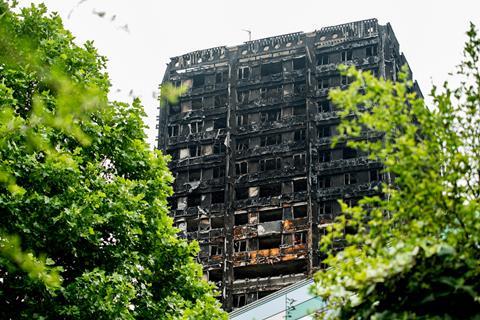LABC fears a shutdown of building control services in April due to a lack of certified inspectors. How worried should we be? asks Daniel Gayne

On 6 April this year another milestone will be passed in the government’s overhaul of UK building safety. This date marks the deadline for building control professionals to register with the Building Safety Regulator (BSR). If they don’t they will no longer be able to practice legally.
Is the industry ready? It is not looking good.
Lorna Stimpson, chief executive of Local Authority Building Control, earlier this month wrote to the government to warn that a “significant number” of local authorities will be unable to undertake building control services from April unless a deadline to register and achieve certification is extended.
Since then, the government has announced that it is working with the BSR on a ‘managed transition’ to the new building control regime, after warnings that its current deadline could cause a large number of councils to suddenly stop work. But when asked for clarification, DLUHC was unable to confirm details or whether this might mean a delay in the introduction of the new rules.
As things stand, many surveyors will have to pass new competence examinations before they are able to register at the appropriate level. But the BSR’s schema of registration classes and sub-classes is complex, and nobody is quite sure exactly how many people are currently employed in the sector (the loose consensus is between 4,000 and 5,000), let alone how many are needed at each level of qualification.
While the situation is complicated, the bottom line is simple. Gavin Dunn, chief executive of one of the bodies tasked with overseeing the accreditation process, puts it bluntly: “I can tell you this, if it is 4,500 [needed], there won’t be 4,500 people available in April.”
So how did we get here? Why is it proving difficult to get people registered in time and what is at stake?
Why are building control professionals being asked to register?
The development of competence in building safety professionals was a key recommendation of Dame Judith Hackitt’s landmark review undertaken in the aftermath of the Grenfell Tower fire, which led to 72 people losing their lives. Her suggestion resulted in the creation of a new protected profession of “registered building inspector”, with the new Building Safety Regulator to oversee the register.
There will be four classes of building inspector under the new system. Class one is intended for trainee building control professionals, and no proof of competence will be required. However, building safety teams will have to demonstrate that class one building inspectors are being appropriately supervised by registered inspectors at the appropriate level.
Class two covers basic building inspection, with six subcategories covering different types and heights of building, while class three and its two subcategories cover specialist work. The fourth class covers building control technical manager roles – people will register at this level if they are managing a team of building inspectors, although they will not have to demonstrate competencies beyond class two and three. After certification, individuals will be re-evaluated against the Building Inspector Competence Framework every four years.

How does the registration process work?
There are three companies approved by the BSR to carry out competence assessments for building control inspectors: Building Safety Competence Foundation (BSCF), a community interest company that is a wholly owned subsidiary of Local Authority Building Control; the Chartered Association of Building Engineers (CABE); and Total Training and Development, on behalf of the Association of Building Approved Inspectors.
Each organisation has its own assessment methods and its own way of breaking up the registration categories. The BCSF, for instance, uses online assessments over an interview-based process, and offers three bands of assessment. Band A covers the level of certification needed to register at category 2A, which allows inspectors to handle building control for small domestic units, band B is a generalist qualification, covering registration categories 2A-2F, and band C covers the specialist classes (3G and 3H). “The BSR registration classes are very complex, and we have gone for a non-complicated structure,” explains Lorna Stimpson, chief executive of BSCF and LABC.
> Free webinar: Building control - Navigating the impact of regulatory changes on the wider UK sector
According to Dunn, chief executive of CABE, its own two-stage methodology is tailored towards more experienced building control inspectors. “Different ways of learning and assessment are appropriate to different people,” he says. “So, depending on whether you are a young graduate or a highly experienced person that came off the tools, it is about providing choice with different methods […] There are three schemes which deliver to the same standard, but they are using different methods tailored to different individuals.” Total Training’s system also has two stages: portfolio evaluation and an interview phase.
Why is there concern about whether people get accredited?
Despite the efforts of these three bodies, there are fears about the number of people getting their credentials in order, which have not been helped by the speed at which the system has been introduced.
The requirements for the accreditation scheme were first published in June, with BSCF and CABE approved as accreditation bodies in July; Total was approved at a later stage. It was not until autumn that the first programmes went live to customers. “If the expectation was that everyone in the market needs to go through in less than a year, that just can’t be true,” says Dunn.

Stimpson says it “would have been fabulous” to have twice as long to prepare the sector, adding that they “have been ready and prepared for quite some time to go through this process”.
The major fear, though, is that experienced building control professionals will simply opt for retirement. Dunn explains: “If you are 60 years old and you have access to your pension and you are only thinking of working for another two or three years anyway, and then someone comes along and says you are going to have to spend a lot of money and lots of time to be reassessed for something that you have not been into school for for 30 years, what is happening is people are bringing forward retirement dates.”
If you’ve been doing something as a professional surveyor for many, many years and then somebody decides that you have got to prove that you are competent to do it, that could be taken as quite an affront to some people
Stimpson notes that for some it may be a matter of pride. “If you’ve been doing something as a professional surveyor for many, many years and then somebody decides that you have got to prove that you are competent to do it, that could be taken as quite an affront to some people,” she says.
Others might simply choose to take their talents elsewhere. “It is a very hot market, and so there are people who are also being attracted away from building control to do other roles within the sector,” says Dunn, explaining that building control knowledge is particularly sought after by housebuilders. “Their skills are very highly regarded within the industry,” he adds.
How many will be certified by April?
It is very hard to say. There could be a big upsurge in registrations at the class one level, but that is meant for trainees. For the higher levels, there are exams to be passed – not something that can be done overnight.
The picture here is complicated by the different methodologies employed by the accreditation bodies.
Unlike BCSF’s process, which involves big assessment days (the most recent was 11 January, the next is 20 February), Total’s process is constantly putting people through assessments with their bank of 125 interviews, allowing them to have a quicker turnaround period on applications.
To be assessed and certified prior to 6 April, BSCF applicants would have had to get their applications in by 1 January, while Total Training is currently operating on a two-week turnaround from portfolio submission to interview.
“I certainly don’t think that we are going to have the whole of the working profession registered, and my big worry is that there will be a large exodus of people in March who will leave the profession rather than have to go through this process.”
Lorna Stimpson, chief executive, LABC
There are currently 1,213 people registered in Total’s system, and according to David Barley, director of education and learning, there are even more who have submitted applications that are yet to be added to the system. He would like to see all those people accredited by the start of April, but says that “people being people, I can’t see that happening”.
He added: “We would like to think we can get three-quarters of those people, but it is down to them,” noting that the company is reliant on people submitting the proper documentation within the intended timeframe. Barley could not provide information on how many have so far been certified by Total.
As of 30 January the BSCF had 2,483 people in its process, of whom 646 had completed portfolio assessment, making them eligible to book for written assessment. Just 152 had passed written assessment and been certified. “I would like to think that we will have 1,000 through the system [by April],” says Stimpson. “I certainly don’t think that we are going to have the whole of the working profession registered, and my big worry is that there will be a large exodus of people in March who will leave the profession rather than have to go through this process.”

According to CABE’s Dunn, its process is possible to complete within roughly six weeks. The organisation has issued approximately 460 applications as of 31 January, with 420 having completed stage one processing. Roughly 120 have completed their stage two submissions, with around 60 interviews arranged and just 40 completed. Dunn would not speculate on how many would be credentialed by CABE by the deadline, but says he believes its to be the smallest of the three schemes.
Taking the loose estimates of each of the three organisations together, an optimistic forecast would suggest the combined number of professionals credentialed by April is likely to be less than 2,500.
This is some way off that 4,500, figure, but bear in mind that these figures relate only to professionals who require accreditation in order to register – so those class one, trainee-level building control inspectors are not counted.
The BSR itself has said that, as of 12 January, 1,318 registration application had been started by building control professionals. “Our experience from the HRB [Higher-Risk Buildings] Register suggests we will see a significant increase in applications as the April 2024 registration deadline approaches,” a spokesperson said.
Will it be enough?
In one sense, this is a very difficult question to answer. The very fact that there is no existing register means it is difficult to know how many existing inspectors there are at each level of experience.
“No one really knows how many you need,” says Dunn. ”We don’t know what number BSR believes is sufficient in terms of building control officers needed; and the other question is: what level of registration do you need? You don’t need everyone qualified to the highest level. In every team you would expect one or two individuals qualified to the highest levels and a ratio of people qualified down to the lower levels.”
> See also: It’s probably going to take a year for industry to get familiar with the new Building Safety Act regime
There could plausibly be a massive increase in class one registrations in the weeks approaching the April deadline, but whether these will provide the level of experience needed for a functioning building control system is another question. In all likelihood, the picture will be a varied one, particularly across local authorities’ building control departments.
Stimpson says: “I was told that out of one team of about 15, there may be five of them that go. But [in] others the whole team are already fully validated and registered. I think until April you can’t put a figure on this.”
If a local authority or a private sector building control provider doesn’t have a registered building inspector in place, what happens?
But there is a sense in which the answer is, once again, very simple. “Are there enough building control officers? The answer is no,” says Dunn, explaining that the sector is already short of labour. He has been told by recruiters that there are five vacancies for every candidate, the result of “30 years of decline”, with young blood failing to replace an ageing workforce.
What happens if there aren’t enough qualified inspectors?
LABC is urgently reviewing the position of all councils in England and Wales to determine how many surveyors are likely to be certified and registered prior to the deadline.
In Stimpson’s letter to the DLUHC, BSR and Welsh Government she says “the picture does not currently look encouraging” and warns a “significant number” of local authorities will be unable to undertake building control services from April.
What does this mean? Stimpson has laid out some of the potential implications and activity that may be halted (see below). She says ”the impact on a local authority of being without registered building inspections will obviously have a wide-ranging effect on the construction industry, consumers, regulatory enforcement, and compliance”.
What ceasing building control services could mean
- Current ‘in flight’ construction will not be inspected.
- Stop and compliance notices cannot be served.
- The possibility that no further building control certifications (restricted functions) will be provided.
- Work reverting to Local Authorities from RBCAs whose surveyors are not registered may in turn not be regulated.
- Work reverting to Local Authorities from Approved Inspectors that do not register as RBCAs may not be regulated as above.
- Currently there is in-flight work reverting on mass from Approved Inspectors preparing to register as RBCAs which may not be regulated.
- Local authorities may be unable to perform their statutory duties as described in the Building Act 1984.
- Local authority inspectors may be unable to support the BSR with building control expertise within individual MDTs
Source: LABC letter
She acknowledges there are difficulties all sectors face when going through professionalisation for the first time and says she believes in the register, describing it as putting building control “where it needs to be again”. In the long run, she thinks the new regulatory environment will create a demand for skilled labour and make the sector more attractive to newcomers.
In the immediate future, however, she seems keen that there be some kind of contingency plan that does not simply “kick the ball down the road”. In her letter Stimpson calls for a six month extension to the registration deadline.
But asked whether she expects the BSR to introduce such a “soft landing” for registration, Stimpson’s answer is not wholly reassuring. The accreditation bodies are providing regular updates on the number of people going through the system, she tells Building, “so I assume they are coming up with a plan B”. BSR has however not confirmed whether this is the case.
Risk & Regulations Live is back in 2024!

Join us this March for two full days of expert panel debates exploring the latest regulatory reform impacting the built environment.
Day one will consist of two webinars focused on the latest building safety changes and how they are affecting the industry.
Day two will be made up of several virtual sessions looking at the broader regulatory changes set to impact the sector in 2024.
See here to view the full programme and register for your chosen sessions.
















No comments yet